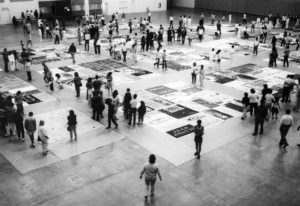In 1988, the World Health Organization established World AIDS Day, one of eight major global health campaigns begun by the United Nations. It stands today as a reminder that, after forty years, tens of millions of people have died of HIV/AIDS, and approximately 37 million are currently living with the disease. It also should remind us of how terrifying this disease is, how it hurts those the most who have the fewest resources with which to defend themselves, and how we are nowhere near an end to the spread of HIV and the suffering it causes.

Last year, the Oral History Center released a 7-episode podcast about the first efforts to understand, track, and treat a mysterious new illness that was killing gay men in San Francisco. Based on the three dozen interviews conducted by Center historian Sally Smith Hughes, First Response: AIDS and Community in San Francisco highlights both the larger context of the arrival of the epidemic and the on-the-ground drama of the physicians, nurses, epidemiologists, and laboratory researchers who were fighting for scarce resources while also fighting the disease.
For decades now, HIV/AIDS has been evolving into different disease, as it spread around the world into new social, economic, technological, and cultural contexts. By 2010, new infections in the United States were three times as likely to be among African American and Latino populations as among white men, for example.
There is therefore a lot of work for us to do at the Oral History Center to map the past thirty years of the epidemic. Sadly, however, many of the themes of First Response are still relevant today: the stigmatization of the disease, a reluctance to pay for the public-health and primary-care interventions necessary to check the spread of HIV, and our general struggle to address the larger context in which survivors of HIV find themselves. For now, we will be working with partners to develop curriculum content for Grade 11 classrooms across the country around the First Response podcast and our collection of interviews. If you would like to help with this work developing assignments and content for educators, please contact Paul Burnett at pburnett@berkeley.edu.